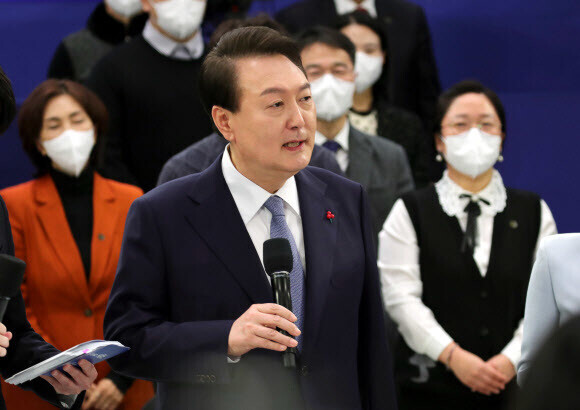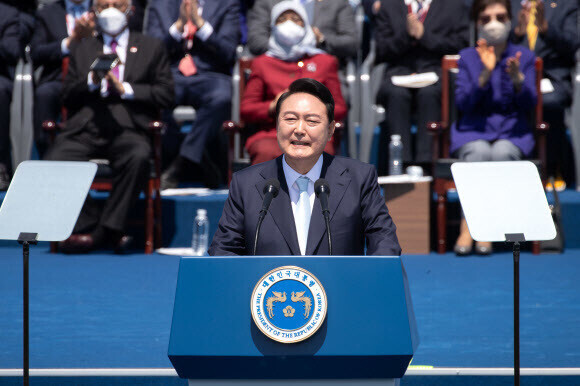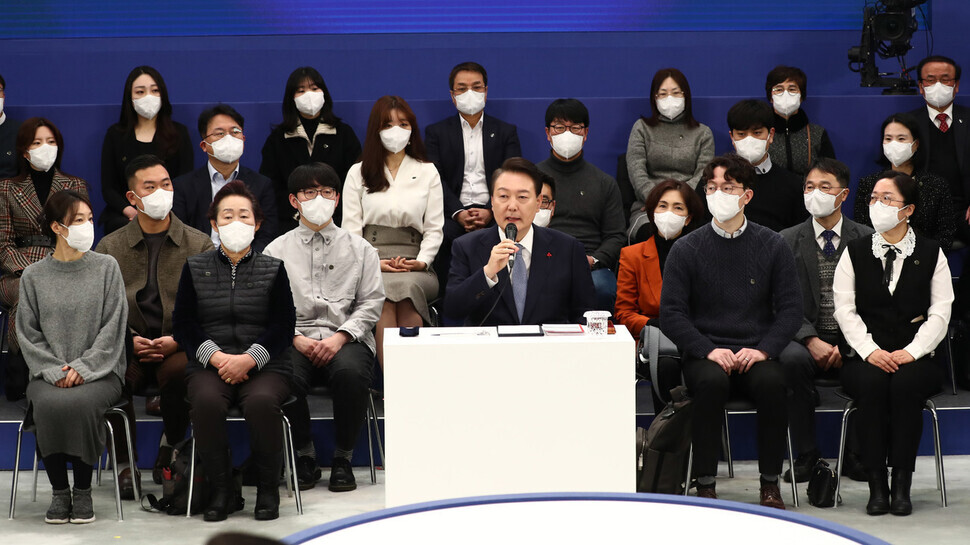hankyoreh
Links to other country sites 다른 나라 사이트 링크
The troubling far-right tendencies of Korea’s Yoon Suk-yeol

Yoon Suk-yeol did not start out as someone with a strong political bent. This may have been natural for him as someone who had worked nearly his entire life as a prosecutor. At one point, he so much as admitted that he had “zero sense for politics.”
On page three of the Hankyoreh issue on Sept. 9, 2019, I published an article titled “As prosecutors deftly navigate administration, are prosecutorial reforms running aground?” The gist of it was that the investigation then-Prosecutor General Yoon Suk-yeol was leading against minister of justice nominee Cho Kuk had the underlying aim of thwarting reforms to the prosecution.
“What sort of person is Prosecutor General Yoon Suk-yeol?” I wrote at the time. “The general assessment in and around the prosecutors is that he is a ‘dangerous’ man. He is a ‘prosecutionist.’ His ideology is neither conservative nor progressive: his ideology is ‘the prosecutors.’ That’s what makes him dangerous.”
But the following day, several news outlets published artists quoting Yoon as insisting that he was not a “prosecutionist,” but a constitutionalist. Here’s what one article in the Chosun Ilbo said:
“At a recent meal with Supreme Prosecutors’ Office officials, Yoon Suk-yeol reported said something to the effect that while other people view him as a ‘prosecutionist,’ he is fundamentally a constitutionalist. This was a rebuttal of comments from some quarters that the prosecutors are investigating Cho [Kuk] in order to sabotage prosecution reforms.”
The same article also said, “In response to claims by criticism that his investigation of Cho is political, Yoon has reportedly said that he has ‘no interest whatsoever in politics’ and that ‘for the prosecutors to be politically biased is like corruption,’ adding that [the prosecutors] ‘merely need to maintain neutrality and perform their proper role.’”

At the time, Yoon did not have much of a political identity in either direction. The change seems to have come out after he made up his mind to enter politics as his feud with the Moon Jae-in administration intensified.
At a ceremony for incoming prosecutors on Aug. 3, 2020, Yoon dropped some unexpected remarks. This was at a time when then-Justice Minister Choo Mi-ae had invoked command authority to exclude him from an investigation into allegations of collusion between the prosecutors and media.
“We must always take deeply to heart the constitutional spirit that criminal law reflects: that of liberal democracy, fair competition and protecting society’s vulnerable,” he said at the time.
“As a core value of our Constitution, liberal democracy does not mean solely valuing freedom while ignoring equality. It refers to true democracy, the kind that rejects dictatorship and totalitarianism that wear the mask of democracy,” he went on.
“Liberal democracy is realized through the rule of law. Laws may be enacted based on the principles of representation and majority rule, but once a law is enacted, it must be applied and executed fairly for all.”
This was an unusual example of a prosecutor general making political statements, emphasizing the importance of “liberal democracy” and the “rule of law.” Once he had gotten the ball rolling, his political remarks would become more and more highly pitched.
In a visit to the Daegu High Prosecutors’ and District Prosecutors’ Office on March 3, 2021, he declared that the complete removal of the prosecutors’ investigation authority was the “epitome of corruption.” When he stepped down as prosecutor general on March 4, he gave the following message:
“Today, I am resigning as prosecutor general.
“The constitutional spirit and the rule of law system that have sustained this country are being destroyed. The damage from that will fall entirely on the public. I can no longer stand by and watch while the justice and common sense that have been established with such difficulty by this society come crumbling down.
“I have done all I can with the prosecutors. But just as I have done to date, I will do my utmost to uphold liberal democracy and protect the public going forward, from whatever position. I wish to thank those who have supported and encouraged me, and also those who have harshly criticized me.”
This time, he used very political language: words and phrases like “rule of law,” “justice,” “common sense,” and “liberal democracy.” In terms of the amount of impact and resonance that he packed into a relatively brief message, it was on par with any politician.
That same message about “liberal democracy” and the “rule of law” was repeated by the politician Yoon Suk-yeol when he announced on June 29, 2021, that he was entering the presidential race.
“This [Moon] administration is not stopping at the privatization of government authority but seeking to prolong its rule so that it can continue plundering the South Korean public. It is trying to take the ‘liberal’ part away from the liberal democracy that is the backbone of our Constitution.
“Democracy is meant to preserve freedom, and freedom means drawing limits on the government’s authority. So when democracy loses freedom, it is not a true democracy but a dictatorship and autocracy.”
“Freedom” was also a central theme in his inaugural address as president on May 10, 2022. Indeed, he used the word for “freedom” or “liberty” no fewer than 35 times there. He did not use the word for “unity” at all.
Perhaps even he felt embarrassed over the omission. On his way to work the following morning, he explained, “Some have remarks on the fact that I did not talk about ‘unity’ in my inaugural address yesterday. The reason is that [unity] is too obvious to mention.”
“Our very political process is a process of national unity. I was talking about what values we should be pursuing to achieve unity.”
At the time, Yoon still appeared to have given some thought on how to achieve national unity and cooperate with the political opposition. This is apparent from some of the remarks he made in a May 16 administrative policy speech on a National Assembly supplementary revised budget bill, where he spoke of “nonpartisan cooperation transcending camps and factions,” “Britain’s wartime coalition Cabinet between the Conservative and Labour Parties,” and “parliamentarism as true liberal democracy.”

Seven months into his presidency, Yoon has swung fully to the far right. On Dec. 13, he let loose with explosive remarks at a Cabinet meeting.
“The forces looking to tear down liberal democracy have been engaging in instigation with repeated lies to deceive the public, and when that doesn’t work, they try to use violence to scare people. We cannot compromise with such forces. If we cannot fix this, this is not a country.
“Upholding liberal democracy means we must value the truth. This is why I entrust administration duties to experts rather than agitators. Cooperation and compromise are possible with people who agree that freedom is the basic value of our community, but we cannot work with those seeking to remove freedom or those who routinely practice false incitement and intimidation.”
I saw these remarks as a declaration of war against the political opposition and the South Korean public. No matter how many times I re-read it, all I could see was a carbon copy of the logic used during the Park Chung-hee dictatorship when it suppressed the dissident and student movements fighting for democracy by branding them as “subversives” and “communist sympathizers.” It was exactly the sort of thing you’d expect to see in the platform or constitution of a far-right minority party.
Exactly who are the ones “seeking to remove freedom” or “routinely practicing false incitement and intimidation”? He seemed to be talking about the parties, news outlets, and people who criticize Yoon Suk-yeol. It was astonishing.
Who is “seeking to remove freedom” if not Yoon Suk-yeol himself? Who is “routinely practicing false incitement and intimidation” if not Yoon, the staff of his presidential office, and his key supporters in the People Power Party?
Yoon’s fixation on “liberal democracy” was also evident in a governance task review meeting broadcast live on TV on Dec. 15. In his closing remarks, he said, “Many people have talked about how the liberal democracy I have been speaking of since my candidacy is not something tangible. But through this meeting today, I could sense how freedom of choice, a sense of solidarity among the members of society, and the common denominator of the rule of law are consistent throughout this administration’s governance tasks and governing philosophy.”
This was farfetched to say the least. It’s hard to see any connection at all between Yoon’s governance tasks and “liberal democracy.”
Yoon’s far-right approach does not stop at rhetoric. It has also been manifesting, terrifyingly, through real actions.
Among his announcements was a plan for establishing his administration’s position in favor of drastically increasing the current 52-hour cap on weekly working hours. Commenting on a strike by the Cargo Truckers’ Solidarity Division (TruckSol), he said, “We must hold them fully accountable for illegal actions that occurred during the strike.”
He also announced plans to do away with “Moon Jae-in care,” the policies implemented by the Moon administration to increase health insurance guarantees. Yoon denounced them as “popularity-pandering populist policies that waste taxpayer money.”
Meanwhile, with Yoon’s crew at the helm, the prosecutors have turned their sights on Moon in their investigation of his administration’s response to the shooting of a South Korean government employee by North Korean soldiers in the West Sea.
How to avoid alienating the publicWhat accounts for all of this? Yoon Suk-yeol wasn’t always this sort of dyed-in-the-wool ultra-right winger. It isn’t clear that his recent far-right behavior is a reflection of his actual convictions.
Presumably, he is doing this to make up for the decline in his approval rating caused by various issues that took place in the early stages of his government. Yoon could be trying to unite conservative voters through an anti-labor, anti-welfare stance and the prosecution’s investigation into the former president.
This is similar to what former president Lee Myung-bak did. It could be that the president, seeing a slight rebound in his approval rating after suppressing the truckers strike, is starting to think that this is the best strategy to adopt.
But will such an approach succeed? In the short term, it may seem to work. But, ultimately, this strategy will fail. Why? Because Yoon’s ideas of liberal democracy and ruling a country by law are overly ideological. It’s an old-fashioned way of thinking.
This is not the era of Park Chung-hee or Chun Doo-hwan. The world we live in today is complex and sensitive.
Yoon needs a surgical knife that is used by professional surgeons, not a machete used to cut plants in a jungle. A competent surgeon must have a lion’s heart, a lady’s hands, and the eyes of an eagle. All that Yoon has right now, however, is a lion’s heart. As for hands, he appears to have the clumsy paws of a bear and the eyes of a rhino.
I beseech President Yoon Suk-yeol: Do not be fooled by the shallow compliments of so-called conservative newspaper commentators. They will incite you and, after gaining what they want, will abandon you. Please don’t end up regretting this when it’s too late. Instead, maintain a balanced stance.
Yoon is the president of the Republic of Korea. So why is he acting like the general of some far-right battalion?
By Seong Han-yong, senior editorial writer
Please direct questions or comments to [english@hani.co.kr]

Editorial・opinion
![[Column] Season 2 of special prosecutor probe may be coming to Korea soon [Column] Season 2 of special prosecutor probe may be coming to Korea soon](https://flexible.img.hani.co.kr/flexible/normal/500/300/imgdb/original/2024/0426/3317141030699447.jpg) [Column] Season 2 of special prosecutor probe may be coming to Korea soon
[Column] Season 2 of special prosecutor probe may be coming to Korea soon![[Column] Park Geun-hye déjà vu in Yoon Suk-yeol [Column] Park Geun-hye déjà vu in Yoon Suk-yeol](https://flexible.img.hani.co.kr/flexible/normal/500/300/imgdb/original/2024/0424/651713945113788.jpg) [Column] Park Geun-hye déjà vu in Yoon Suk-yeol
[Column] Park Geun-hye déjà vu in Yoon Suk-yeol- [Editorial] New weight of N. Korea’s nuclear threats makes dialogue all the more urgent
- [Guest essay] The real reason Korea’s new right wants to dub Rhee a founding father
- [Column] ‘Choson’: Is it time we start referring to N. Korea in its own terms?
- [Editorial] Japan’s rewriting of history with Korea has gone too far
- [Column] The president’s questionable capacity for dialogue
- [Column] Are chaebol firms just pizza pies for families to divvy up as they please?
- [Column] Has Korea, too, crossed the Rubicon on China?
- [Correspondent’s column] In Japan’s alliance with US, echoes of its past alliances with UK
Most viewed articles
- 1‘We must say no’: Seoul defense chief on Korean, USFK involvement in hypothetical Taiwan crisis
- 2After election rout, Yoon’s left with 3 choices for dealing with the opposition
- 3Why Kim Jong-un is scrapping the term ‘Day of the Sun’ and toning down fanfare for predecessors
- 4Noting shared ‘values,’ Korea hints at passport-free travel with Japan
- 5AI is catching up with humans at a ‘shocking’ rate
- 6Two factors that’ll decide if Korea’s economy keeps on its upward trend
- 7Amnesty notes ‘erosion’ of freedom of expression in Korea in annual human rights report
- 8[Editorial] Korea’s surprise Q1 growth requires objective assessment, not blind fanfare
- 9A week of protests lays bare many inherent vices of Korean health care system
- 10Yoon says collective action by doctors ‘shakes foundations of liberty and rule of law’